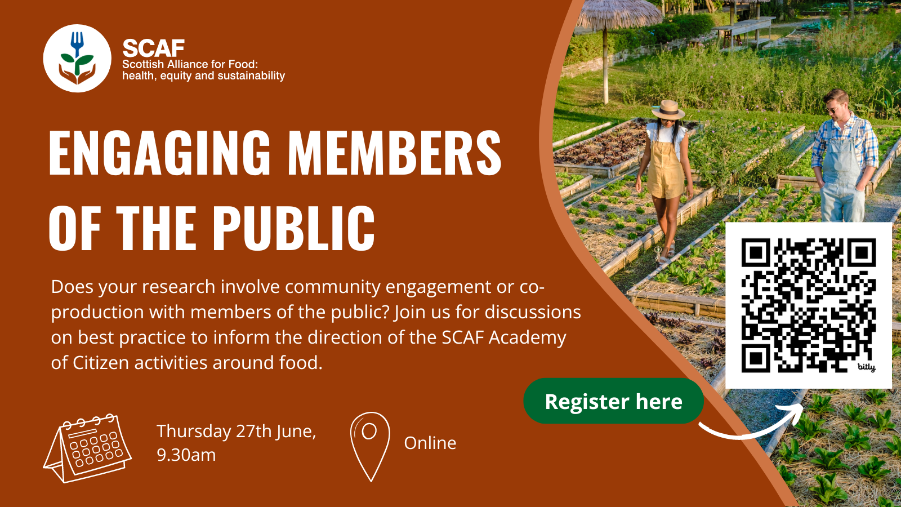Developing Research with Members of the Public | June 2024
Published: 15 June 2024
An informal online event for members to share ways in which they are engaging with members of the public around food and other topics.
Online Meeting - Developing Research with Members of the Public
SCAF is hosting an informal online event on June 27th, 9.30-11.00 am, and inviting members to share ways in which they are engaging with members of the public around food (and other topics), specifically around research and co-production.
During the meeting, we would like to share experiences and discuss learnings, with a view to inform the SCAF Academy of Citizens future activities. This meeting aims to be the first step towards engaging both the SCAF network and members of the public to co-design SCAF’s Academy of Citizens model.
Sharing best practices for engaging members of the public in research | Briefing Notes
27/06/2024, 9.30 – 11.00, Online (Zoom)
11 participants
Chaired by:
Michael Johnson & Cindy Gray (Co-leads of SCAF Academy of Citizens workstream) and Emilie Combet (SCAF Director)
Purpose of this meeting:
To share examples of public engagement in research and discuss learnings/good practices to inform the SCAF Academy of Citizens model
Summary:
- Emilie Combet introduced the Scottish Alliance for Food (SCAF), including its aim, values, structure and activities (SCAF website). SCAF aims to bring people together from across sectors, disciplines and career stages to respond to critical emerging research questions about building a better food future for all. SCAF is structured into 4 themes with a public engagement workstream (Academy of Citizens, AOC) across all four themes.
- Cindy Gray and Michael Johnson, AOC leads, introduced the AOC and the aim of today’s session. The AOC includes people interested in food, but have no professional link to food/nutrition. The aim of AOC is to ensure that SCAF’s research priorities reflect people’s lived experiences and needs.
- Participants shared examples of their research with public engagement, including the ReDIRECT Study, TREES exhibition, The Modern Outpatient, and community-based projects in Africa and the UK (Culture and Bodies – Malawi and Tanzania, Cycle Nation - Manchester, Air Network - Nairobi), and reflections. Further projects not presented include the Scottish Food Library, invisible illness projects that looked to explore creative practice expression of people’s experiences (among other examples)
Show & Tell - Big diversity on approaches to public engagement
Art-based approaches, e.g. exhibition, art commissions, written articles, to break down complex subjects (e.g. TREES exhibition)
Participatory form of design to explore future research, frame research questions, and identify challenges (e.g. The Modern Outpatient – patients with multiple long-term conditions mapping their experiences in the analogy of a solar system (planets = conditions moving around them, shooting stars = positive moments, meteor strikes = disruptive experiences))
Community-based, creative and participatory workshops to co-develop research, e.g.
- Culture and Bodies Project: teachers, arts practitioners and local communities came together to develop research methods that were culturally appropriate with the idea of understanding risks, barriers, and facilitators to people changing their diet and physical activity. Verbalization of what non-communicable diseases feel, sound and taste like and showing what they look like through images and performances to understand motivations behind actions and how we could intervene to support people to change their behaviours.
- Air Network project in Nairobi – week-long workshop with the community, used games and play to understand each other's way of working, shared meals to build trust and relationships, set agreement on how they were going to work together, codesigned mini projects about issues that the community members felt were important and were led by members of the community with a co-lead from the UK
- Cycle Nation project in Manchester - Community delivery with a local champion who kept the momentum in the community going (e.g. Cycle Nation project) – local champion was essential to build trust between the community and research teams
Patient Public Involvement (e.g. ReDIRECT Study) of people with lived experience can bring invaluable insights to health research – e.g. navigating communication around controversial topics and shaping research design to the needs and interests of patient group.
Awareness campaigns, e.g., the ELDOWEEKA Awareness Project by the International Medical Sports Nutrition Association in Egypt. Free clinical assessments and awareness talks about healthy nutrition, lifestyle and affordable foods. Focus on simplifying knowledge as much as possible and communicating evidence-based knowledge in particular to mothers who will be able to pass on this knowledge to their families, with activities for teenagers alongside
Reflections and Takeaways
- Engaging citizen/members of the public takes time and resources!
- Working with citizens to coproduce research requires equitable footing – they should be paid for their work
- Creative practice is often key to engaging citizens
- Building trust and relationships is essential
- Skills training can facilitate engagement in participating, co-producing and co-leading projects
- Sustainability of research outcomes – important to involve all key stakeholders in the project to ensure that project outcomes are taken forward
- Bottom-up approach – letting people themselves find out what is important for them, designing culturally appropriate research
Next steps/interests
- thinking about how we build on this for SCAF and the importance of ensuring equitable contributions in terms of resourcing and power relations/othering
- exploring how to support engagement with the research process - highlighting the value of it not just for researchers, but also members of the public as participants
- creating a transdisciplinary, reflective framework/toolkit/guidance around citizen engagement in food
- compiling a resource with different examples from different perspectives (there is no one-size-fits-all solution), exploring how to translate what comes out from academic research to the general public in a more digestible way
First published: 15 June 2024


